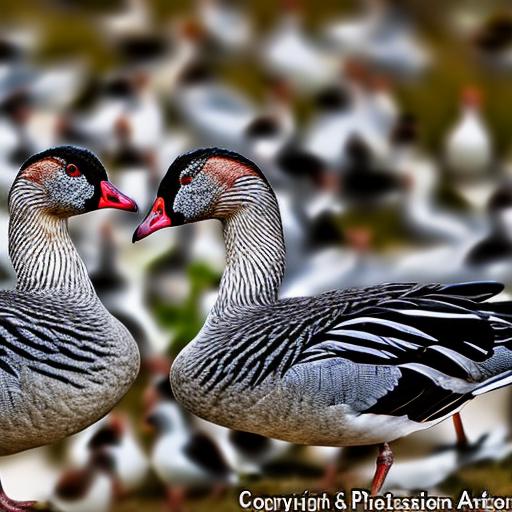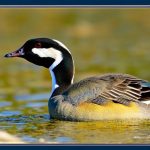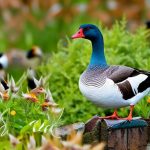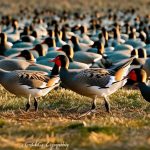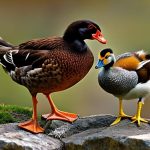Geese are a common sight in many neighborhoods, parks, and open spaces. While they may seem harmless, understanding their behavior is crucial for maintaining a safe and healthy yard. Geese can cause damage to property and pose health risks to humans and pets. By implementing effective deterrents and control methods, you can create a safe environment for yourself and your family.
Key Takeaways
- Geese are attracted to yards with open spaces, water sources, and easy access to food.
- Geese can pose health risks and cause property damage, including lawn destruction and aggressive behavior.
- Natural deterrents for geese include planting tall grasses, using motion-activated sprinklers, and installing fencing or netting.
- Physical barriers like fences, netting, and obstacles can also be effective in keeping geese away.
- Scare tactics such as motion-activated devices, repellent sprays, and loud noises can be used to deter geese from your yard.
Understanding the Behavior of Geese: What Attracts Them to Your Yard
Geese are social animals that often travel in large flocks. They are attracted to areas that provide them with food, water, and shelter. Lawns and open spaces with short grass are particularly appealing to geese as they provide easy access to food sources such as grass and insects. Additionally, bodies of water such as ponds or lakes are attractive to geese as they provide a source of drinking water and protection from predators.
The Dangers of Geese in Your Yard: Health Risks and Property Damage
While geese may seem harmless, they can pose health risks to humans and pets. Geese droppings can contain harmful bacteria such as E.coli and Salmonella, which can cause illness if ingested or come into contact with open wounds. Additionally, the accumulation of droppings on walkways and other surfaces can create slip and fall hazards.
Geese can also cause damage to property. Their constant grazing can destroy lawns and gardens, leaving behind unsightly patches of bare ground. They may also damage plants by trampling on them or pulling them out of the ground while searching for food.
Natural Deterrents for Geese: Plants and Landscaping Strategies
One effective way to deter geese from your yard is by using plants that repel them. Geese are deterred by certain types of grasses, such as tall fescue or Bermuda grass, which have a coarse texture that they find unappealing. Planting these grasses in your yard can help discourage geese from grazing on your lawn.
In addition to specific plants, there are also landscaping strategies that can deter geese. Creating barriers such as hedges or shrubs around your yard can make it less accessible to geese. They prefer open spaces where they can easily spot predators, so creating obstacles that limit their line of sight can discourage them from entering your yard.
Physical Barriers for Geese: Fences, Netting, and Other Obstacles
Physical barriers are another effective way to keep geese out of your yard. Fences can be used to create a physical barrier that prevents geese from entering your property. However, it is important to ensure that the fence is at least three feet high and extends underground to prevent geese from flying over or digging under it.
Netting is another option for keeping geese away from specific areas of your yard. By installing netting over ponds or other bodies of water, you can prevent geese from accessing them. However, it is important to regularly check the netting for any damage or gaps that may allow geese to enter.
Scare Tactics for Geese: Motion-Activated Devices and Repellent Sprays

Scare tactics can be an effective way to deter geese from your yard. Motion-activated devices such as sprinklers or lights can startle geese and make them feel unsafe, causing them to leave the area. Additionally, there are repellent sprays available that emit a scent that geese find unpleasant, deterring them from entering your yard.
Sound-Based Deterrents for Geese: Ultrasonic Devices and Loud Noises
Sound-based deterrents can also be effective in keeping geese away. Ultrasonic devices emit high-frequency sounds that are unpleasant to geese but not audible to humans. These devices can be placed in your yard to deter geese from entering.
Loud noises can also be used to scare geese away. This can be done by clapping your hands, using a whistle, or playing loud noises such as a radio or a horn. The sudden and unexpected noise will startle the geese and make them feel unsafe, causing them to leave the area.
Visual Deterrents for Geese: Decoys, Reflective Surfaces, and Bright Colors
Visual deterrents can be effective in deterring geese from your yard. Decoys such as fake predators or plastic owls can be placed in your yard to make geese feel unsafe. Geese are wary of predators and will avoid areas where they believe there is a threat.
Reflective surfaces can also be used to deter geese. By placing reflective tape or objects in your yard, the sunlight will reflect off them and create a visual disturbance that geese find unsettling.
Bright colors can also deter geese. By planting flowers or using brightly colored objects in your yard, you can create an environment that geese find unappealing.
Humane Solutions for Geese: Relocation and Habitat Modification
If you are dealing with a persistent geese problem, there are humane solutions available. Relocating geese to a more suitable habitat is one option. However, it is important to consult with local wildlife authorities before attempting to relocate geese, as there may be regulations in place.
Habitat modification is another humane solution for controlling geese populations. By making changes to your yard that make it less attractive to geese, such as removing food sources or creating barriers, you can discourage them from staying in the area.
The Importance of Consistency in Geese Control: Maintaining a Safe Yard
Consistency is key when it comes to controlling geese in your yard. It is important to regularly implement deterrents and control methods to ensure that geese do not become accustomed to them. By consistently maintaining a safe yard, you can prevent geese from establishing a presence and causing damage.
Seeking Professional Help: When to Call in Experts for Geese Removal
In some cases, it may be necessary to call in experts for geese removal. Signs that it’s time to seek professional help include a large and persistent geese population, extensive property damage, or health risks that cannot be effectively managed on your own. When choosing a professional geese removal service, it is important to research their methods and ensure that they prioritize humane and ethical practices.
Geese can be a nuisance and pose health risks and property damage if not properly managed. By understanding their behavior and implementing effective deterrents, you can create a safe and healthy yard for yourself and your family. Whether through natural deterrents, physical barriers, scare tactics, sound-based or visual deterrents, or humane solutions such as relocation or habitat modification, taking action to control geese in your yard is essential for maintaining a safe environment.
If you’re looking for ways to keep geese away from your yard, you might also be interested in learning about how to build a farmhouse chicken coop. A well-designed coop not only provides a safe and comfortable home for your chickens but can also serve as a deterrent for geese. Check out this informative article on poultrywizard.com that offers valuable insights and tips on constructing a farmhouse chicken coop: https://poultrywizard.com/keeping-chickens/farmhouse-chicken-coop/. By implementing the right coop design and features, you can create an environment that is less attractive to geese while ensuring the well-being of your feathered friends.
FAQs
What are geese?
Geese are waterfowl birds that belong to the family Anatidae. They are known for their distinctive honking sound and their V-shaped flying formation.
Why do geese come to yards?
Geese are attracted to yards because they offer a source of food, water, and shelter. They also provide a safe place for geese to rest and raise their young.
What problems do geese cause in yards?
Geese can cause a number of problems in yards, including damaging lawns and gardens, leaving droppings that can be unsightly and unsanitary, and creating noise and disturbance.
What keeps geese away from yards?
There are several methods that can be used to keep geese away from yards, including using decoys, installing fencing or netting, using repellents, and modifying the landscape to make it less attractive to geese.
Are there any natural ways to keep geese away from yards?
Yes, there are several natural ways to keep geese away from yards, including planting certain types of vegetation that geese do not like, using noise-making devices, and introducing natural predators like dogs or hawks.
Is it legal to harm or kill geese?
No, it is illegal to harm or kill geese without a permit. Geese are protected under the Migratory Bird Treaty Act, which makes it illegal to harm or kill them without a permit from the U.S. Fish and Wildlife Service.
Meet Walter, the feathered-friend fanatic of Florida! Nestled in the sunshine state, Walter struts through life with his feathered companions, clucking his way to happiness. With a coop that’s fancier than a five-star hotel, he’s the Don Juan of the chicken world. When he’s not teaching his hens to do the cha-cha, you’ll find him in a heated debate with his prized rooster, Sir Clucks-a-Lot. Walter’s poultry passion is no yolk; he’s the sunny-side-up guy you never knew you needed in your flock of friends!

